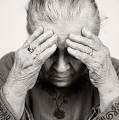Did you know the longer we live, the more likely we are to suffer life-changing situations and grief in our lives that might bring on bouts of depression? We’re more vulnerable to changes and sometimes don’t have the energy or the money or any other means to change situations that happen to upend our lives.
Most elderly depression occurs when there is separation or loss. There’s a feeling of helplessness, especially if aging leads to poverty and isolation. Even a bout of bad weather may cause depression if an elderly person feels “stuck.” The elderly are certainly more vulnerable than the rest of the population and as physical and environmental changes lead to isolation, depression may occur.
 There are a couple types of depression that you should be aware of. Short-term depression occurs in most all of us at some time or other in our lives, but severe depression is more serious and may require some type of medical care or intervention. Severe depression is when the feelings become so agonizing that it extends to every area of life, and the person suffering may think that there’s no solution.
There are a couple types of depression that you should be aware of. Short-term depression occurs in most all of us at some time or other in our lives, but severe depression is more serious and may require some type of medical care or intervention. Severe depression is when the feelings become so agonizing that it extends to every area of life, and the person suffering may think that there’s no solution.
The depression may be so severe that reason or encouragement from others can’t penetrate the wall of sadness that forms a shell around the victim. There are a number of “depression guides” online and quizzes that you can take to test your level of depression, but that should also be possible by using a bit of introspection. When you examine your mind and soul, you should be able to discern whether or not you’re depressed.
You may be depressed if you feel sad and lonely and can’t seem to shake the feeling, or you might have trouble sleeping and become irritable. You may eat too much or lack any kind of appetite at all and you also may have problems in focusing on anything you’re doing or planning to do. Crying uncontrollably and often is also a symptom of depression.
Everyone may suffer from the above depression symptoms at some point, but when the feelings become deep and dark and the victim begins to lose self-confidence, energy, emotions run rampant, no sex drive and an intense mood changes that result in loss of interest in everything that he or she once cared for, the depression may be severe and counseling or medication may be in order.
Any type or symptom of depression that could last for years is called Dysthymic disorder and may cause physical health problems sooner or later if not treated. Reactive depression is a depressed state caused by stress or a situation in life. Bipolar disorder is a type of depression in which a person has severe mood swings from low to high — and possible other symptoms.
Thinking about death and even attempted suicide is a major and concerning part of severe depression. See your health care provider if you experience these thoughts. Depression can be treated.
Leave a Reply